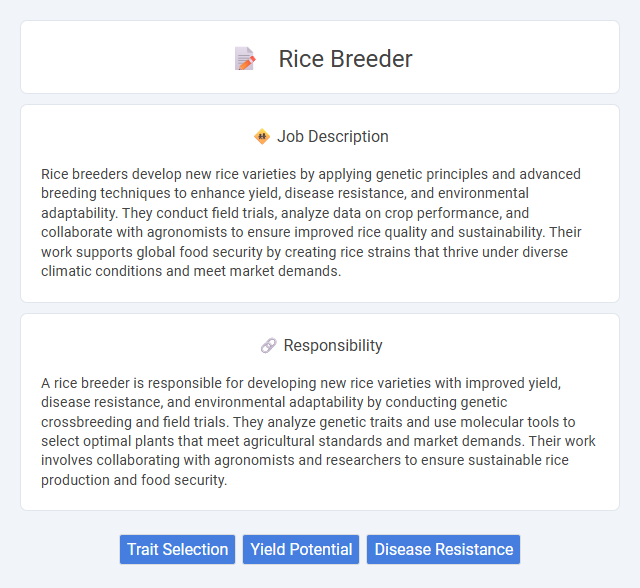
Rice breeders develop new rice varieties by applying genetic principles and advanced breeding techniques to enhance yield, disease resistance, and environmental adaptability. They conduct field trials, analyze data on crop performance, and collaborate with agronomists to ensure improved rice quality and sustainability. Their work supports global food security by creating rice strains that thrive under diverse climatic conditions and meet market demands.
Individuals with a strong interest in plant genetics and agricultural science are likely to find a career as a rice breeder suitable due to the specialized knowledge required in crop improvement. Candidates who enjoy detailed experimentation, fieldwork, and data analysis might thrive in this role, while those who prefer less hands-on or lab-intensive jobs may not be as well-suited. Physical stamina and patience could be important, considering the outdoor conditions and the lengthy breeding cycles involved in rice breeding.
Qualification
A rice breeder must have a strong background in plant genetics, agronomy, or crop science, typically holding at least a bachelor's degree in these fields, with many positions requiring a master's or Ph.D. Detailed knowledge of molecular biology, plant pathology, and biostatistics enhances effectiveness in developing high-yield, disease-resistant rice varieties. Experience in field trials, data analysis, and the use of genomic tools is critical to optimize breeding programs and achieve sustainable crop improvement.
Responsibility
A rice breeder is responsible for developing new rice varieties with improved yield, disease resistance, and environmental adaptability by conducting genetic crossbreeding and field trials. They analyze genetic traits and use molecular tools to select optimal plants that meet agricultural standards and market demands. Their work involves collaborating with agronomists and researchers to ensure sustainable rice production and food security.
Benefit
Rice breeders likely experience the benefit of contributing to global food security by developing high-yield, disease-resistant rice varieties. They probably enjoy opportunities for research funding and collaboration, enhancing innovation within agricultural science. Career stability and potential for impact in sustainable farming practices may also be significant advantages in this role.
Challenge
Rice breeder roles likely involve navigating challenges such as improving crop yield and disease resistance under changing climate conditions. The complexity of genetic variation and the integration of biotechnological tools may present continuous hurdles. These professionals probably need to balance innovation with sustainability to meet global food demand effectively.
Career Advancement
Rice breeder professionals advance their careers by gaining expertise in genetic improvement techniques, experimental design, and biotechnology applications specific to Oryza sativa. Progression often involves roles such as senior breeder, research scientist, or program manager within agricultural research institutes or seed companies, emphasizing cultivar development and yield enhancement. Continuous professional development through workshops, advanced degrees, and publications in peer-reviewed journals enhances opportunities for leadership positions and international collaboration.
Key Terms
Trait Selection
Rice breeders specializing in trait selection focus on identifying and incorporating desirable genetic traits such as drought tolerance, disease resistance, and high yield into rice varieties. Advanced techniques like marker-assisted selection (MAS) and genomic selection enhance the precision and efficiency of breeding programs. Their work contributes to developing resilient rice cultivars that improve food security and adapt to changing environmental conditions.
Yield Potential
Rice breeders specialize in developing high-yield rice varieties by selecting and crossbreeding plants with superior genetic traits to maximize grain production. They utilize advanced techniques such as molecular markers and genomic selection to accelerate the breeding process and increase yield potential. Their work directly contributes to food security by enhancing rice varieties that thrive under diverse environmental conditions and resist pests and diseases.
Disease Resistance
Rice breeders specializing in disease resistance employ advanced genetic techniques and field evaluations to develop rice varieties with enhanced resilience against pathogens such as blast fungus, bacterial blight, and sheath blight. They utilize marker-assisted selection and genomic tools to identify and incorporate resistance genes, improving crop durability and yield stability. Their work contributes to sustainable agriculture by reducing dependency on chemical pesticides and mitigating crop losses caused by infectious diseases.
 kuljobs.com
kuljobs.com